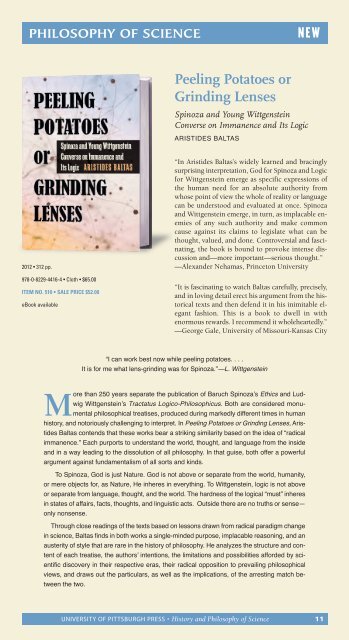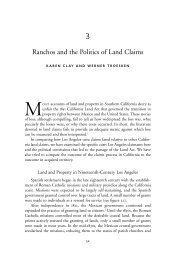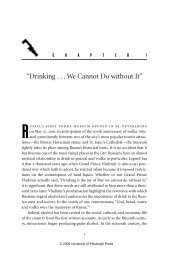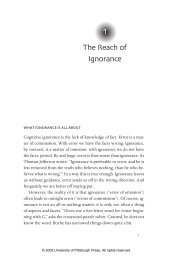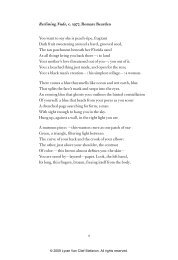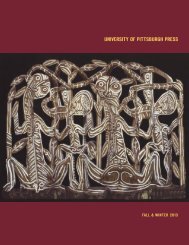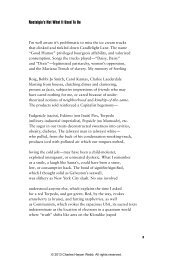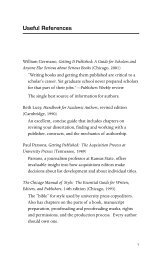History and Philosophy of Science - University of Pittsburgh Press
History and Philosophy of Science - University of Pittsburgh Press
History and Philosophy of Science - University of Pittsburgh Press
Create successful ePaper yourself
Turn your PDF publications into a flip-book with our unique Google optimized e-Paper software.
PHILOSOPHY OF SCIENCE NEW<br />
2012 • 312 pp.<br />
978-0-8229-4416-4 • Cloth • $65.00<br />
ITEM NO. 510 • SALE PRICE $52.00<br />
eBook available<br />
Peeling Potatoes or<br />
Grinding Lenses<br />
Spinoza <strong>and</strong> Young Wittgenstein<br />
Converse on Immanence <strong>and</strong> Its Logic<br />
ArIStIDeS bAltAS<br />
“In Aristides Baltas’s widely learned <strong>and</strong> bracingly<br />
surprising interpretation, God for Spinoza <strong>and</strong> Logic<br />
for Wittgenstein emerge as specific expressions <strong>of</strong><br />
the human need for an absolute authority from<br />
whose point <strong>of</strong> view the whole <strong>of</strong> reality or language<br />
can be understood <strong>and</strong> evaluated at once. Spinoza<br />
<strong>and</strong> Wittgenstein emerge, in turn, as implacable enemies<br />
<strong>of</strong> any such authority <strong>and</strong> make common<br />
cause against its claims to legislate what can be<br />
thought, valued, <strong>and</strong> done. Controversial <strong>and</strong> fascinating,<br />
the book is bound to provoke intense discussion<br />
<strong>and</strong>—more important—serious thought.”<br />
—Alex<strong>and</strong>er Nehamas, Princeton <strong>University</strong><br />
“It is fascinating to watch Baltas carefully, precisely,<br />
<strong>and</strong> in loving detail erect his argument from the historical<br />
texts <strong>and</strong> then defend it in his inimitable elegant<br />
fashion. This is a book to dwell in with<br />
enormous rewards. I recommend it wholeheartedly.”<br />
—George Gale, <strong>University</strong> <strong>of</strong> Missouri-Kansas City<br />
“I can work best now while peeling potatoes. . . .<br />
It is for me what lens-grinding was for Spinoza.”—L. Wittgenstein<br />
More than 250 years separate the publication <strong>of</strong> baruch Spinoza’s Ethics <strong>and</strong> ludwig<br />
Wittgenstein’s Tractatus Logico-Philosophicus. both are considered monumental<br />
philosophical treatises, produced during markedly different times in human<br />
history, <strong>and</strong> notoriously challenging to interpret. In Peeling Potatoes or Grinding Lenses, Aristides<br />
baltas contends that these works bear a striking similarity based on the idea <strong>of</strong> “radical<br />
immanence.” each purports to underst<strong>and</strong> the world, thought, <strong>and</strong> language from the inside<br />
<strong>and</strong> in a way leading to the dissolution <strong>of</strong> all philosophy. In that guise, both <strong>of</strong>fer a powerful<br />
argument against fundamentalism <strong>of</strong> all sorts <strong>and</strong> kinds.<br />
to Spinoza, God is just nature. God is not above or separate from the world, humanity,<br />
or mere objects for, as nature, He inheres in everything. to Wittgenstein, logic is not above<br />
or separate from language, thought, <strong>and</strong> the world. the hardness <strong>of</strong> the logical “must” inheres<br />
in states <strong>of</strong> affairs, facts, thoughts, <strong>and</strong> linguistic acts. outside there are no truths or sense—<br />
only nonsense.<br />
through close readings <strong>of</strong> the texts based on lessons drawn from radical paradigm change<br />
in science, baltas finds in both works a single-minded purpose, implacable reasoning, <strong>and</strong> an<br />
austerity <strong>of</strong> style that are rare in the history <strong>of</strong> philosophy. He analyzes the structure <strong>and</strong> content<br />
<strong>of</strong> each treatise, the authors’ intentions, the limitations <strong>and</strong> possibilities afforded by scientific<br />
discovery in their respective eras, their radical opposition to prevailing philosophical<br />
views, <strong>and</strong> draws out the particulars, as well as the implications, <strong>of</strong> the arresting match between<br />
the two.<br />
UNIVERSITY OF PITTSBURGH PRESS • <strong>History</strong> <strong>and</strong> <strong>Philosophy</strong> <strong>of</strong> <strong>Science</strong> 11


